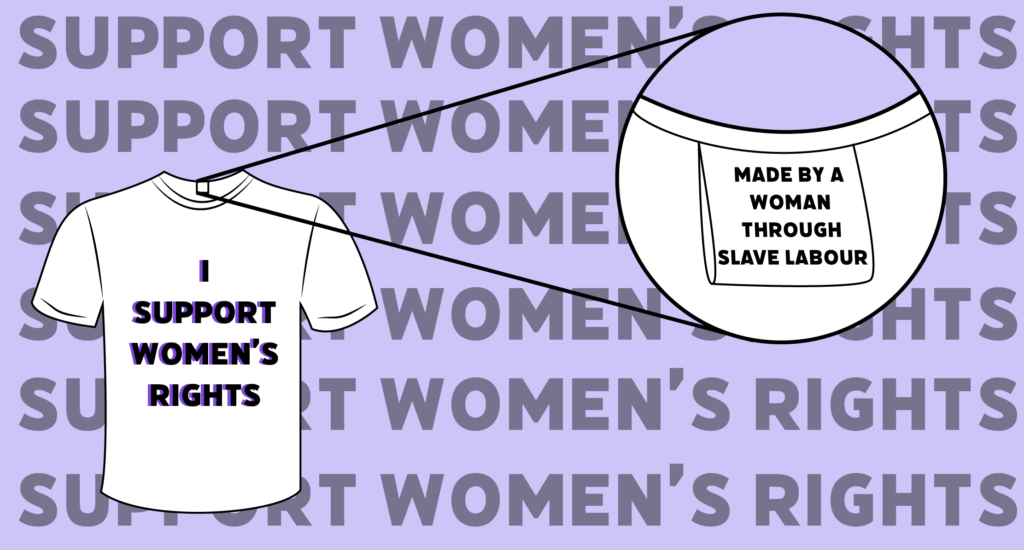The constant evolving nature of the fashion industry and the West’s capitalist culture calls for faster delivery times for new products, different clothes every month and cheap prices. Fast fashion is this process of making cheaper and trendy clothes within a quicker call time, and along with these benefits comes plenty of disadvantages. As brands are on the move to meet the demands of its consumers as much as they can, they fail to acknowledge the lives they put at risk in the process.
The clear divide between the consumers in the West and the workers in the countries where fast fashion factories are located, needs to be recognised as a bigger issue of racial and gender inequality. Mintel’s senior retail analyst Samantha Dover says that consumers are becoming more concerned with the environmental impact of the clothes they are buying – this concern should also include the humanitarian issue of racism and anti-feminism which is prevalent in the fast fashion industry.
Fast fashion brands are reliant on the trend cycle (which determines what clothes will become popular) and consumers’ conformist culture to allow them to make a profit – new trends provide new opportunities to sell new clothes and make more money. While Gen Z and younger consumers (many of whom are targeted by fast fashion brands) are becoming more involved and active in raising awareness for humanitarian and environmental issues, fast fashion brands are using this as a ‘trend’ and a new opportunity to secure profit.
When brands claim to care about certain issues, but are in fact contributing to the issue at hand and not looking to improve or change, this ‘allyship’ becomes performative and further contributes to the industry’s human rights issues. A number of fast fashion brands have been called out for performative allyship, including industry giant Boohoo who recently faced a ‘modern slavery investigation‘. A report found workers who make their clothes in Leicester were being exploited in order to make bigger profits for the company. The hypocrisy at the heart of these brands is problematic and needs to change.
Many brands within the fashion industry can be questioned about their activism towards feminism. From Missguided’s ‘Everyone Should Be a Feminist’ top to Urban Outfitters’ ‘Feminist’ t-shirt, brands have found a way to capitalise the word ‘feminist’ without supporting the women who make their clothes. The Labour Behind the Label campaign informs us that approximately 80% of garment workers are women aged 18-35, and many of these workers are underpaid and overworked. Brands have found a way to make profit through the feminism movement while being anti-feminist themselves. The evident divide between the West and the rest of the world shows how easy it is to forget about the workers that make clothes, however feminism needs to include every woman globally, and not just the ones around us.
When discussing the issues with fast fashion, racial inequality needs to be part of the conversation too. Within the industry there is a racial hierarchy of power, where workers in other countries are unheard and their issues are unspoken. The lack of human rights in these factories and the exploitation of foreign workers is inherently racist, as a lot of fast fashion brands rely on the unfair treatment of workers from other countries in order for them to make a profit. Not paying workers fairly and forcing them to work in unsafe conditions shows a lack of concern or support for foreign workers which adds to the racial inequality issue that is prevalent within this industry.
As consumers, we should start to recognise our spending power in controlling these fast fashion brands who are hypocritical and exploitative in their practices – these brands are so focussed on consumer demand that if consumer demands start to shift towards more ethical and environmentally brands, these fast fashion brands will change too. We have a choice in deciding where our money goes and choosing to give money to a company that takes advantage of people gives them an incentive to keep going. Recognise your privilege and your power to change the fast fashion industry, and help it move to a more ethical place.






1 Comment
Amazing outlook on the issues ongoing within the fast fashion industry! i loved it!